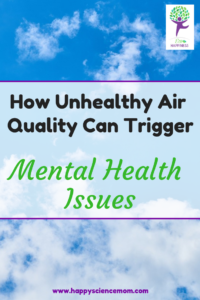 How often do you stop and think about how clean the air is? Most of us take it for granted, yet clean air is essential to keeping us happy and healthy.
How often do you stop and think about how clean the air is? Most of us take it for granted, yet clean air is essential to keeping us happy and healthy.
Poor air quality—whether inside your home or outdoors—can cause a whole host of health problems like headaches, skin problems, irritation of the eyes and throat, fatigue, asthma, chronic obstructive pulmonary disease (COPD), cardiovascular disease, and even stroke. Now researchers are also finding that polluted air can trigger mental health issues like anxiety and depression. Why is this the case and what can we do to protect our family?
Types Of Air Pollution
Shockingly, the air we breathe can contain up to over 180 toxins. When outside, many of these pollutants come from vehicles and factories, while others result from natural events like forest fires and volcanoes. Much of this air pollution is considered particulate matter (PM), which are small bits of toxins, allergens, and other components that linger in the air. When inhaled, PM can enter both our lungs and blood, causing damage to our cells and organs. PM can lead to health issues such as cancer, heart attacks, stroke, high blood pressure, and diabetes. It has also been linked to anxiety and depression since long exposure to pollutants can lead to behavioral and mood changes.
Spending time outside is not the only way we can be exposed to air pollution. Buildings, including our own home, can be filled with air pollutants like dust or particulate matter, carbon monoxide, sulfur dioxide, nitrogen dioxide, and volatile organic compounds (VOCs). In fact, Indoor air quality tends to be two to five times worse than the outdoor air.
How do we end up with poor indoor air quality? Tobacco smoke, cleaning products, air fresheners, gas appliances, paints, carpet, furniture, pet dander, adhesives, personal products like perfume, and other consumer products can damage the air we breathe indoors. The indoor air quality can also be affected by the outside air. If we don’t have a good ventilation system, harmful pollutants from outside like exhaust from vehicles and nearby sewer air can seep indoors. Finally, if we don’t have adequate ventilation from our kitchen and laundry room, that air can remain stagnant in our house.
Linking Environmental Pollution & Mental Health
A number of studies indicate how air pollution can change behavior and lead to mental health issues like anxiety and depression. Some examples include:
- A study by Monika Bullinger in the Journal of Environmental Psychology from back in 1989 found that environmental pollution, specifically sulfur dioxide, caused a change in mood and stress and an overall decrease in well-being.
- Research at Columbia University from 2012 published in the journal Environmental Health Perspectives found that pregnant women exposed to high levels of air pollution put their children at increased risk of developing anxiety and depression. In urban areas, most residents are exposed to pollution, particularly to compounds called polycyclic aromatic hydrocarbons (PAHs) — the byproduct of burning fossil fuels, tobacco, and other organic material. This study looked at 253 non-smoking inner-city women who gave birth between 1999 and 2006. Those with the highest levels of detectable PAH in their homes during their third trimester of pregnancy were 4.5 times more likely to have children with anxiety problems. Specifically, women with higher levels of PAH in their blood at the time of delivery were 23 percent more likely to have children scoring higher on the anxiety and depression measures than those with lower levels, and babies who had elevated amounts of PAH in their cord blood were 46 percent more likely to be anxious or depressed than those with the lowest amounts.
- A study from 2015 by The Johns Hopkins University and Harvard University focused on whether air pollution may worsen the symptoms of anxiety. Researchers looked at the mental health of nearly 70,000 women. They found that the women exposed to higher levels of fine particulate matter (PM) had worse anxiety symptoms. In fact, women who lived 50 to 200 meters from a major road were more likely to have higher anxiety symptoms than those living farther away. The researchers think that air pollution may weaken the body’s ability to fend off disease and affect how cells function, which in turn may lead to anxiety. Air pollution may also worsen other health problems. Since managing a chronic condition is stressful, this can raise anxiety levels.
- A study from 2017 looked at the association between air pollution and anxiety and depression in older adults. Scientists found that an increase in ambient fine particulate matter (PM2.5) was significantly associated with both anxiety and depression symptoms.
- A 2019 study published by King’s College London in the journal JAMA Psychiatry looked at whether psychotic experiences are more common among teens exposed to higher levels of air pollution. Psychotic experiences (i.e. experiencing things like hearing or seeing things other people don’t or feeling very paranoid) were significantly more common among teens in the highest quartile of pollution exposure, even after the researchers accounted for factors that might also be linked to psychosis, such as cigarette smoking, cannabis dependence and neighborhood crime levels. It’s possible that if air pollution is indeed causing psychosis, then the gases and particles might be causing brain inflammation, which previous research suggests may be linked to psychosis. Pollutants could also be stunting brain development during sensitive periods.
Another way that unhealthy air quality can trigger anxiety is that if the air causes someone to feel physical symptoms like coughing, breathing issues, or skin and eye irritation, they can start to get panicky. Feeling anxious can then lead to additional symptoms like headache, nausea, weakness, dizziness, sleepiness, and hyperventilation. If these symptoms keep occurring in a certain room or building, then they will begin to feel anxious when there and want to leave as soon as possible. This can be especially troubling if it’s their home because that is where they want to feel safe, comfortable, and relaxed. This situation can then ultimately lead to depression if the problem does not get resolved and they are unable to move.
If you or your child is experiencing mental health issues like feeling anxious or depressed, it’s important to reach out to a trained professional who can help you. Check out the best online therapy sites to find a counselor to work with your family.
How To Improve Your Home’s Indoor Air Quality
Maintaining healthy indoor air quality is essential for mental and physical health. Here are 10 ways for you to make sure that the current air quality in your home is safe and healthy for your family:
- Don’t smoke; minimize exposure to secondhand smoke from cigarettes, cigars, and other tobacco products.
- Use an air purifier to help capture some of the irritants.
- Choose household cleaners that do not contain harmful chemicals.
- Prevent carbon monoxide exposure by making sure appliances such as gas stoves vent to the outside whenever possible and that all appliances are properly installed, used, and maintained.
- Choose paints and paint thinners that do not contain VOCs.
- Seal your air ducts.
- Replace carpet with hardwood or natural flooring.
- Change your heating and air conditioning filters regularly.
- If you have pets, keep them out of the sleeping areas and away from upholstered furniture, carpets, and stuffed toys. Vacuum (use a vacuum with a HEPA filter) and clean carpets, rugs, and furniture often to reduce pet dander and hair.
- Open your window to get some fresh air in.
What About The Air Outside?
Although you have much more control over the indoor air quality of your home than you do of the air outside, you can take action to help ensure that environmental pollution continues to be regulated to protect the health of our children and future generations. Learn more from these resources:
- United Stated Environmental Protection Agency
- Moms Clean Air Force
- Center for Clean Air Policy
- Clean Air Task Force
- Earthjustice
- Union of Concerned Scientists
How do you maintain healthy air quality in your home?





Very interesting read. I didn’t realize how much air quality impacts mental health. I know it bothers my allergies, but didn’t realize it could impact other things too. Thanks for sharing.
Wow! This is really interesting. I wouldn’t have believed it if not for the studies. Very well written article.
Very interesting read! This has a lot of good information in it. I never realized just how much this could actually affect people until now. It was never something I really thought about so thank you for shedding some light!
This is really interesting information that you’re sharing. Our bodies are resilient, but truly sensitive in nature to the environment that surrounds us. Thank you for compiling this research and sharing.
Very informative! Thank you for sharing!
Very interesting!
Very interesting! I live in Vietnam, Hanoi, so our air quality is the worst in the world haha. It’s definitely given me breathing problems from living here, but I’m much happier and no longer suffer from crippling anxiety problems, much better than when I lived in the UK. I can definitely see the link , as it’s just simply not good for us to be living with polluted air but I also think mental health depends on so many aspects. Thank you for sharing! 🙂
Thank you for an informative read. Like others, I didn’t realize the impact my environment could be having on my mental health. I live with Bipolar Disorder so this was important to me. Keep up the great work!
Thank you for spreading awareness about this! I have multiple chemical sensitivities, so being around smoke, strong perfume or any strong odors or bad air quality will mess me up for the whole day. It’s so important for people to be aware of this!